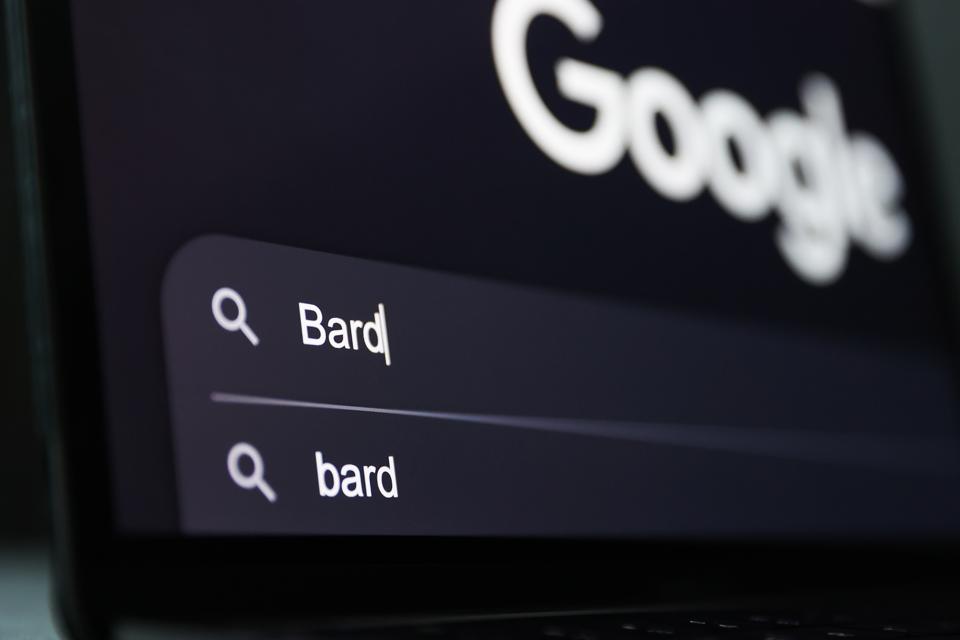Google stock has been a decent investment this year. Yet the company’s single-digit revenue growth reflects its inability to monetize generative AI — thus inhibiting Google’s stock momentum.
Shares of the search giant have risen 10% this year as of April 5 — matching the Nasdaq’s 10% increase while lagging the boffo stock market performance of Nvidia (+83%), Meta Platforms (+52%), and a few other magnificent seven stocks, about which I wrote in an April 2 Forbes post.
Google employees who invented the technology behind the large language models powering generative AI have flown the coup to start their own companies. Google has stumbled in its efforts to commercialize the technology.
The company — with a whopping $98 billion in cash net of debt, according to the Wall Street Journal — seems to be flailing in an effort to invest in winning growth opportunities.
Will Google charge consumers for AI-powered search, as a Reuters report suggested last week? Or will the search giant try to boost its advertising market share by acquiring HubSpot, rumors of which Reuters first reported?
My guess is neither of these will happen — leaving Google struggling to accelerate its revenue growth. While Google could charge consumers for AI-powered search, I doubt many will pay the price. Moreover, the government’s antitrust-fueled crackdown on big tech acquisitions could well keep Google from completing the HubSpot deal.
Google’s Disappointing Fourth Quarter Report
Alphabet — Google’s parent — has not lived up to its name. That’s because the name implies the company’s stock will deliver market-beating investment returns — what finance geeks call alpha.
There were two reasons for investor’s disappointment: lower than expected advertising sales in the final quarter of 2023 and a big boost in spending on servers and other technology planned for 2024 “to power artificial intelligence,” noted Reuters.
Here are the key numbers from that report:
- Q4 2023 revenue: $86.3 billion — up 13.5% and $1 billion ahead of estimates, according to London Stock Exchange Group data.
- Q4 2023 advertising revenue: $65.5 billion — up 11% and about $500 million below analysts’ average expectation, according to LSEG.
- Q4 2023 Google Cloud revenue: $9.2 billion — up 25.7% but slower than 32% growth in the year-ago quarter — and $300 million ahead of expectations, Reuters reported.
- Q4 2023 capital expenditures: $11 billion — up 45%. On a conference call with analysts CFO Ruth Porat said capital expenditures would be “notably larger this year than in 2023,” Reuters wrote.
Google’s disappointing ad revenue numbers could be reversed if the Fed cuts interest rates sooner than expected. “Alphabet’s disappointing ad revenue numbers suggest that corporations worldwide are still uncertain about the pace of interest rate cuts from global central banks,” said Thomas Monteiro, an analyst at Investing.com.
Google is making investments aimed at boosting the company’s revenue growth. The search giant is adding powerful Gemini models to its Bard generative AI chatbot. Google contracted to invest up to $2 billion in AI startup, and CEO Sundar Pichai said Alphabet is deploying AI to “deftly answer new questions,” according to Reuters.
Reports Of Google’s AI-Powered Search Fee And Possible Bid For HubSpot
Google is taking steps to boost revenues. The search giant could begin charging customers for its AI-powered search engine and Alphabet is reported to be weighing a deal to acquire HubSpot, a Cambridge, Mass.-based marketing software company.
Google may charge for premium features on its generative-AI powered search engine, anonymous sources told the Financial Times according to Reuters. The tech giant could add AI-powered search features to its premium subscription services — which give Gmail and Docs users access to Google’s new Gemini AI assistant (rebranded from Bard), noted Reuters.
Google will continue to offer the free search engine complemented by ads appearing next to search results. “We’re not working on or considering an ad-free search experience. As we’ve done many times before, we’ll continue to build new premium capabilities and services to enhance our subscription offerings across Google,” the company emailed Reuters.
Google charges a $20 monthly fee for its Google One cloud storage and online safety service — which reached 100 million subscribers in February 2024, according to PYMNTS. Google is considering putting the Gemini AI assistant-powered search behind a paywall that would charge users an undetermined price.
Given the lukewarm user response to Microsoft’s Copilot service — for which the software giant charges $30 per user per month — it is unclear whether Google would fare any better with its Gemini AI powered search service.
Reports surfaced April 4 of a possible Google bid to acquire marketing software company, HubSpot. Alphabet “has in recent days discussed how much it should offer and whether antitrust officials would greenlight the deal,” according to a Reuters report featured in a CNBC report.
The price tag for such a deal would “likely come to more than $40 billion—a 30% premium to HubSpot’s market value from before Reuters reported Google’s interest in the company [last] Thursday,” noted the Journal.
If Google’s acquisition of HubSpot could pass antitrust muster, I estimate — assuming Google could acquire HubSpot for $40 billion, the marketing software company’s revenue keeps growing at 25% a year and earning a 13.5% free cash flow margin for the next decade — the deal would result in a $3 billion negative net present value for Google.
What’s more, given HubSpot’s $2.2 billion in 2023, revenue, the deal would add less than 1% to Google’s top line.
Investors do not see much upside for Google. The 63 analysts who cover the company set a 12-month price target of about $166 — giving the search giant’s stock 7.8% further to run, according to MarketWatch.

